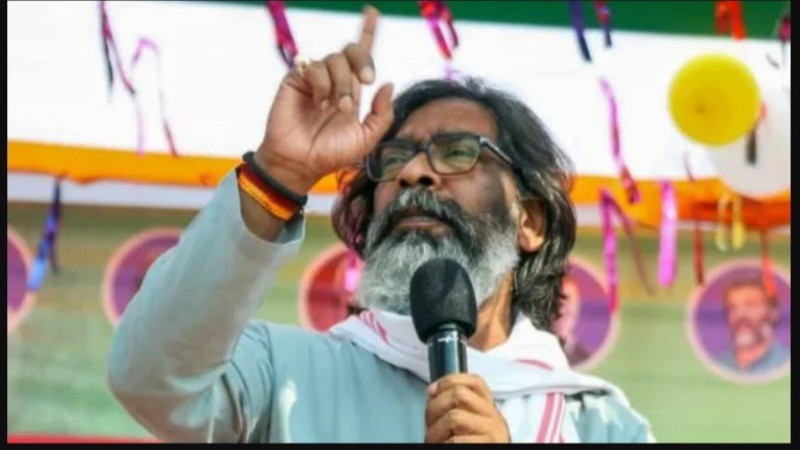
As the 2024 Jharkhand Assembly elections draw near, Chief Minister Hemant Soren's party, the Jharkhand Mukti Morcha (JMM), is once again pushing its agenda of tribal rights and welfare. However, there are growing doubts about whether the party has genuinely improved the lives of the tribal community during its time in power.
One of the key promises made by the Hemant Soren government is the Abua Awas Yojana (Our Housing Scheme), which aims to provide permanent homes for tribal families. The scheme was launched in August 2023, with the objective of giving over 2.5 million people across the state access to safe and affordable housing. Under the plan, beneficiaries were promised a three-room house for ₹2 lakh. While this initiative was meant to uplift tribal communities, reports suggest that many face severe challenges accessing the benefits of the scheme.
Criticism from BJP: Allegations of Corruption
पीएम आवास योजना मिलने के बावजूद पीड़ित व्यक्ति ने हेमंत सोरेन के अधिकारियों को 10 हजार रुपए घूस नहीं दिया तो, क्षुब्ध अधिकारियों ने आवास किसी अन्य को स्थानांतरित कर दिया l
— Babulal Marandi (@yourBabulal) November 24, 2023
हेमंत पिछले 4 सालों से झारखंड में अबुआ आवास का ढिंढोरा पीट रहे हैं l अब तक एक भी व्यक्ति को अबुआ आवास नहीं… pic.twitter.com/hsw3tEN2ci
The BJP has been critical of the Abua Awas Yojana, accusing the JMM government of corruption and inefficiency. Himanta Biswa Sarma, BJP's co-in-charge for Jharkhand, called the scheme a "Babu Awas Yojana," alleging that tribal families can only receive their housing if they pay bribes. This allegation has sparked serious concerns about the scheme's execution.
The Reality Behind the Scheme: Bribery and Bureaucratic Hurdles
While the government claims thousands of tribal families have benefited from the housing initiative, transparency is lacking. Government records do not provide clear statistics on the number of homes built so far. Beneficiaries have reported having to pay bribes to local officials, contractors, and village leaders to expedite the housing process. Without these illegal payments, progress is stalled, leaving families in a state of uncertainty.
Despite government promises to provide housing to all vulnerable families by 2026, the reality on the ground is far from ideal. Many tribal families are trapped in a web of bureaucratic red tape, with no clear information on when or if they will receive their homes.
Allegations of Administrative Failures
Reports from the ground highlight significant administrative failures in the implementation of the Abua Awas Yojana. Many tribal beneficiaries claim they have faced delays due to excessive documentation and a lack of communication from the authorities. This inefficiency not only violates their rights but also raises questions about the government's ability to deliver on its promises.
Are Tribal Communities Truly Benefiting?
While the Hemant Soren government has repeatedly announced various initiatives for tribal welfare, the delivery has been far from satisfactory. Tribal families are often forced to navigate through layers of corruption to access their rightful entitlements. This has led to growing disillusionment among the tribal population, who feel their needs are being ignored or exploited for political gain.
रोटी, कपड़ा, मकान के साथ आज की जरूरत है बिजली, इंटरनेट, शिक्षा एवं सड़क एवं स्वास्थ्य
— Hemant Soren (@HemantSorenJMM) November 8, 2024
आपकी अबुआ सरकार ने बिना किसी जाति, बिना किसी धर्म, बिना किसी अमीरी-गरीबी के आंकड़ें देखे बिना - सभी झारखंडी के लिए -
✅ रोटी - 11 लाख राशन कार्ड धारकों से संख्या बढ़ाकर 40 लाख परिवारों को… pic.twitter.com/M3xYrL7ikp
Apart from the housing scheme, other policies related to land acquisition and employment have also come under scrutiny. Many tribal families feel that these measures have only added to their hardships rather than solving their problems.
Rising Discontent and Growing Protests
The frustrations among tribal communities have led to protests and demonstrations across the state. Many tribal leaders argue that the government’s failure to address their grievances has only worsened their situation. As the Jharkhand elections approach, these issues are likely to play a crucial role in shaping voter opinions. Will the JMM continue to hold the trust of the tribal communities, or will they see it as yet another political party that has failed to live up to its promises?
The 2024 elections will be a critical test for Hemant Soren's government. As tribal communities continue to struggle with unmet promises and growing discontent, the true impact of the Abua Awas Yojana and other initiatives will be closely scrutinized. The outcome of the elections will determine whether the JMM can regain the trust of the tribal population or whether it will face rejection for its failure to deliver meaningful change.